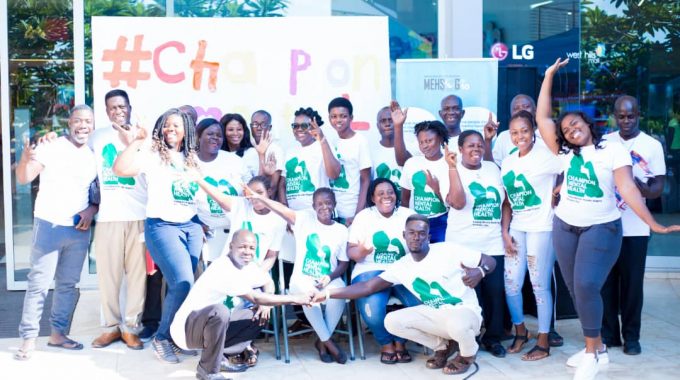
MEDIA ENGAGEMENT ON COVID-19 AND THE IMPACT OF THE PANDEMIC ON MENTAL HEALTH IN GHANA

A section of journalists present at the MEHSOG secretariat for the media engagement.
The subject of mental health is truly a great concern for all during and after the Covid-19 pandemic. It is with this in mind that the STAR Ghana foundation decided to fund a media engagement in collaboration with the Ghana Federation of Disability Organizations (GFD) and Mental Health Society of Ghana (MEHSOG) to highlight the impact of Covid-19 on mental health in Ghana.
Mental health conditions are likely to begin and assume unimaginable proportions, and would also continue after the pandemic is over. Experience of the disease, breakdown of social support and stigma are possible causes of short-term mental health problems during this pandemic while factors such as economic losses can potentially cause long-term mental health issues, as extreme poverty exacerbates mental illness.
The COVID-19 pandemic has indeed presented an unprecedented stressor to these individuals.
The uncertainty of returning to normal life and numerous deaths that were avoidable under usual circumstances are also likely to increase people’s risk of developing long-term mental health issues
In the past year, the COVID-19 pandemic has become one of the leading causes of mental health conditions partly due to the disease experience, social distancing, stigma, discrimination and job losses in Ghana which is one of the countries that have been affected by the pandemic. Health care workers, patients with COVID-19, children, women, youth, and the elderly are experiencing post-traumatic stress disorders, anxiety, increased depression, distress, insomnia, suicidal tendencies and high rate of substance use disorders among others.

Mr. Christopher Agbega representing the Ghana Federation of Disability Organizations (GFD) expressing concern that persons with disabilities may not be prioritized when vaccines arrive in Ghana which may affect the mental health of persons with disabilities.
In Ghana, evidence suggests that even frontline health care workers, who were directly involved in the collection of samples, diagnosis, treatment, and care of patients during an outbreak are also at higher risk of developing psychological distress and mental health symptoms. Anxiety, distress, depression, fear of spread of infection to family, friends and colleagues, anger and confusion were some of the immediate psychological impacts documented among frontline health care workers
Ironically, the World Health Organization (WHO) estimates that 1 in four people will experience a mental health condition in their lifetime.
Generally, most people are afraid to even seek help for their mental health because they think at these hospitals, they might end up getting infected because of the virus’ subtle mode of transmission and contraction.

Esenam Drah -Projects Coordinator for Mental Health Society of Ghana (MEHSOG)
STRATEGIES AND RECOMMENDATIONS TO GOVERNMENT ON WHAT NEEDS TO BE DONE TO CURB INCREASING LEVELS OF COVID -19 MENTAL HEALTH COMPLICATIONS IN GHANA.
Government needs to do more to scale up mental health services and ensure equity and efficiency. The impact of COVID-19 on mental health in Ghana could be immense, given the weak health care systems. Similar to the Ebola epidemic of 2014– 2016, COVID-19 has and is expected to cause increased levels of anxiety, depression and post-traumatic stress disorders.
Mental Health Society of Ghana (MEHSOG), Ghana Federation of Disability Organizations (GFD), BasicNeeds and other stakeholders including WHO had previously highlighted the chronic underfunding of mental health prior to the pandemic.
Some recommendations which are very imperative in relation to the theme of discussion are listed below.
MEHSOG, together with Ghana Federation of Disability Organizations (GFD) believe that:
- The subject of Mental health & COVID-19 should be included in every school’s curriculum as a test free course, so that students can learn how to take care of their mental health during the pandemic.
- Mental health and psychosocial support services need to be integrated into the pandemic response and coordinated nationally. It is critical for these services to continue during and after the pandemic.
- Government should endeavor to collaborate with the survivors of COVID-19 induced mental health challenges and provide them with some psychosocial services and also some alternative livelihood supports.
- Government should work with religious bodies, traditionalists and the general public in disseminating information and education on mental well-being.
- Virtual mental health services should be established in many settings and social media can be used to impart mental health education and communication resources.
- Community health workers can be trained quickly to provide mental health education, screening and counselling services.
- Toll-free mental health helplines can be used to provide services to the general public.
- Psychological services must also be provided at the various health care centres within the communities and the cost should be absolved by the State or subsidized for the client.
- Daily rehabilitation and occupational therapy centres should be established and decentralized.


